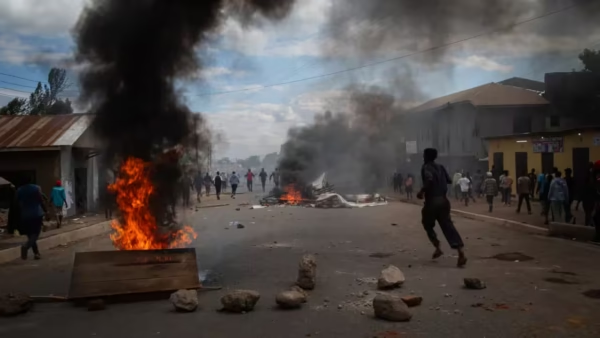Tanzania’s recent landslide election has sparked global concern. Explore the political atmosphere, people’s reactions, and what this result means for democracy in Africa.

A Victory That Stirred the World
Tanzania’s recent presidential election turned heads worldwide. President Samia Suluhu Hassan won by an astonishing 98% margin, a result that left many both proud and puzzled.
Across the country, streets filled with celebrations. Supporters hailed it as a moment of unity and stability. Yet, beneath the cheers, quiet questions began to rise. Was this truly a reflection of the people’s will—or a symbol of something deeper?
The world watched closely, aware that such massive victories often carry hidden stories. You can read more global insights about changing political landscapes at www.america112.com.
The Woman Who Inspired Hope
When Samia Suluhu Hassan became Tanzania’s first female president, the nation felt a wave of hope. She brought warmth, calmness, and an image of progress. Her leadership style seemed gentle but firm—a blend that inspired trust.
At first, she focused on economic recovery and building global relationships. Her message was one of peace and development. For many Tanzanians, she became a symbol of strength and compassion.
Yet, this election result—with almost no opposition—has begun to change that narrative. People now wonder if the voice of democracy has slowly faded under the shadow of power. As one voter said, “We wanted peace, but we also wanted choice.”
To read about how love and hope can rise even in uncertain times, explore Love and Hope Rises Again in Alberta.
The Missing Opposition Voice
Democracy thrives on difference. It lives in debate, diversity, and the courage to disagree. But in this election, the opposition was nearly silent.
Many opposition members faced intimidation, restrictions, and arrests. Campaigns were cut short, rallies were limited, and several candidates withdrew under pressure. Some polling stations reportedly had no independent observers.
People began to whisper the question everyone feared: Is our democracy truly free?
Such silence from opposition parties does not mean peace—it means suppression. A true democracy must allow every voice, even those that challenge power.
What Tanzanians Are Feeling
Tanzanians are proud of their unity and history of peace. But this time, a subtle tension lingers. Many citizens say they are unsure whether their vote really mattered.
For the rural poor, life remains the same—hopeful yet uncertain. Farmers, teachers, and youth express a quiet wish for fairness and opportunity. They want to see development that reaches their hands, not just headlines.
“We love our president,” says a shopkeeper in Dar es Salaam, “but we want to feel that our voice counts.” That sentiment echoes across many African democracies today.
Democracy at a Crossroads
Tanzania stands at a critical moment. The election could either mark the beginning of a stronger, more stable government, or a slide toward one-party dominance.
History has shown that when power goes unchecked, freedom slowly fades. Tanzania’s leaders now face a moral test—to listen to their people, to encourage open dialogue, and to ensure every citizen feels safe to speak.
The world remembers Tanzania as a beacon of calm in a turbulent region. The challenge now is to make sure that calm does not come at the cost of freedom.
For a deeper understanding of national unity and resilience, visit The Spirit of India Sails Strong.
The Global Gaze
Nations across the world are paying attention. The African Union and international observers are urging Tanzania to strengthen transparency and open political participation. Other African countries are also watching, as the outcome could influence their own democratic journeys.
For the international community, this is not just about one country—it’s about the future of democracy in Africa. If Tanzania’s democracy weakens, it may send a message that power is stronger than people’s will.
The Road Ahead
Tanzania’s story is still being written. Its people remain hopeful that President Hassan will restore confidence in democracy. Many believe she has the wisdom and grace to lead with both strength and empathy.
The coming years will decide whether Tanzania becomes a symbol of reform or a warning of regression. The people’s voice, however faint, still matters. It is that voice that can shape the nation’s destiny.
For more updates on global democracy and leadership, explore www.america112.com.
Conclusion
Tanzania’s landslide election tells a powerful story—a mix of pride, peace, and quiet concern. It is a reminder that democracy is not measured by victory margins, but by the freedom to choose.
As citizens continue to hope and question, one truth remains clear: a nation’s greatest strength lies not in the power of one leader, but in the collective voice of its people.

